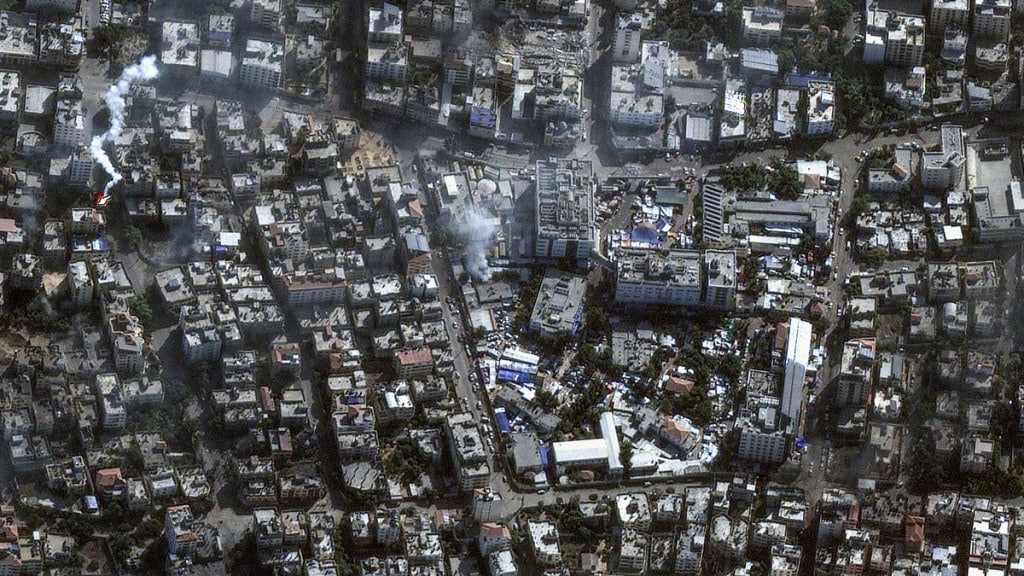In the tumultuous landscape of Gaza, where conflict has become a daily reality, the regional directors of UNFPA, UNICEF, and WHO unite in a resounding call for urgent international action. The very fabric of the region’s healthcare system is unraveling as hospitals, meant to be sanctuaries of healing, bear the brunt of relentless attacks.
Alarming reports emanate from Al-Shifa Hospital, Al-Rantissi Naser Paediatric Hospital, Al-Quds Hospital, and others in Gaza city and northern Gaza. The toll is devastating – lives lost, including innocent children, as the conflict rages on. Hospitals, essential for providing care to the injured and vulnerable, are becoming perilous grounds due to intense hostilities.
The consequences are dire and heart-wrenching. Premature and newborn babies, dependent on life support, face the grim reality of power, oxygen, and water cuts at Al-Shifa Hospital. The precarious conditions extend across multiple healthcare facilities, with staff grappling with shortages of fuel, water, and basic medical supplies. The very foundation of the healthcare system is trembling, putting the lives of all patients in immediate jeopardy.
The statistics are staggering and indicative of a humanitarian crisis spiraling out of control. In the past 36 days alone, WHO has documented 137 attacks on healthcare in Gaza, resulting in a staggering 521 deaths and 686 injuries. Shockingly, health workers on duty have not been spared, with 16 deaths and 38 injuries recorded. Such attacks blatantly violate International Humanitarian and Human Rights Law and Conventions. The right to seek medical assistance, especially in times of crisis, should be sacrosanct, never denied.
Gaza’s healthcare infrastructure, already strained, is buckling under the weight of these relentless attacks. More than half of the hospitals in the Gaza Strip are now closed. Those still functioning are stretched to their limits, able to offer only limited emergency services, life saving surgeries, and intensive care. The shortages extend beyond medical necessities, encompassing water, food, and fuel, placing thousands of displaced individuals, including women and children, at risk.
The transformation of hospitals, meant to be safe havens, into scenes of death and despair is an affront to humanity. It is a stark reminder that decisive international action is not merely a choice but an imperative. The immediate call is for a humanitarian ceasefire to stem further loss of life and salvage what remains of Gaza’s fragile healthcare system. Unimpeded, safe, and sustained access is paramount, a lifeline to provide fuel, medical supplies, and water for critical, lifesaving services.
Meanwhile, the International Committee of the Red Cross (ICRC) adds its urgent voice, pleading for the protection of civilians in Gaza caught in the crossfire. The hostilities, particularly in densely populated urban areas and around hospitals, jeopardize the lives of the most vulnerable – medical staff, patients, the wounded, premature babies, people with disabilities, and the elderly.
William Schomburg, the head of the ICRC sub-delegation in Gaza, paints a haunting picture of a human tragedy unfolding before their eyes. Civilians, fearful of opening their doors, reach out for help, creating an unbearable situation. Humanitarian workers are frustrated, hindered by a lack of basic security conditions to move in North Gaza.
The evacuation process, intended to ensure safety, is itself fraught with peril. Civilians, bearing white flags as symbols of surrender, navigate through kilometers of danger, past lifeless bodies, and with critical shortages of food and water. The urgency is evident – families must not be separated during evacuations.
As civilians move from the north to the south of Gaza, a growing humanitarian disaster looms. A hundred thousand displaced people lack essentials like shelter, food, water, and hygiene. The southern area, ill-equipped to handle this influx, faces insufficiency in humanitarian aid. The ICRC emphasizes the crucial need for an unimpeded and regular flow of humanitarian assistance.
In response to the escalating crisis, the ICRC intensifies its emergency response in Gaza. Surgical teams and critical medical supplies are deployed to support medical facilities throughout the Gaza Strip. The organization, cognizant of the evolving catastrophe, continues scaling up its support for emergency healthcare.
The past days have seen the ICRC coordinating and, in some instances, accompanying convoys to evacuate hospital patients and displaced persons from Northern Gaza. The commitment to alleviating suffering is evident, but challenges persist as the humanitarian crisis deepens.
In this multifaceted crisis, the call for global attention and collaborative action reverberates. The international community must unite to condemn the attacks, protect civilians, and ensure the unimpeded flow of humanitarian aid. Gaza’s plight demands not just words but meaningful, concerted efforts to bring an end to the violence and provide immediate relief to its beleaguered population.

